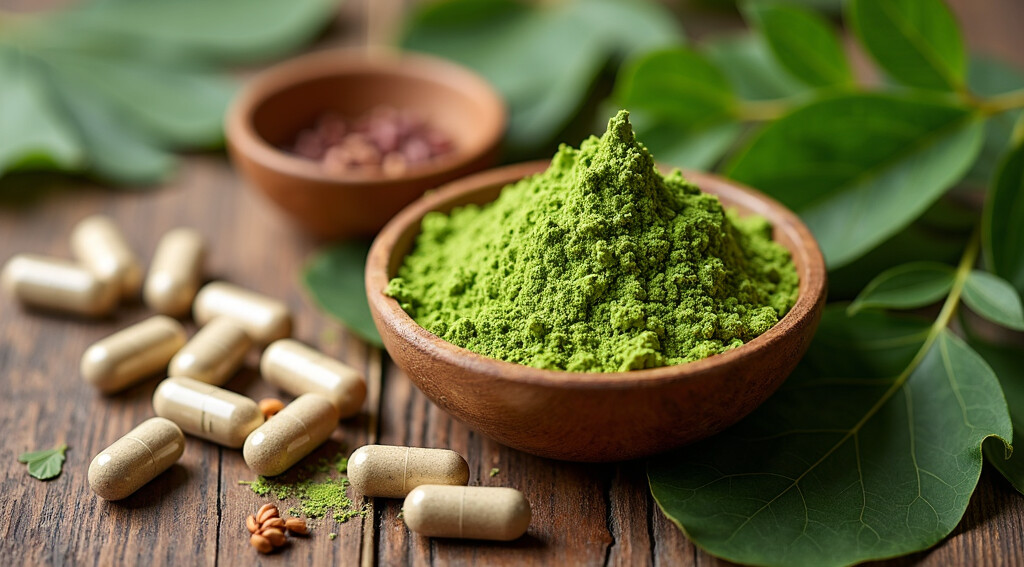Moringa, known as Moringa oleifera, is a plant that catches a lot of attention when the topic of natural nutrition and traditional remedies comes up. Over the years, I’ve picked up quite a bit about it by reading health studies and working it into my own recipes. Sometimes called the drumstick tree, miracle tree, or horseradish tree, moringa is native to parts of Asia and Africa. Just about every part—leaf, pod, and seed—is brimming with nutrients. Many families add it to meals or homemade remedies, lending it a long history of everyday use. Here, I’m going to dig into what makes moringa so interesting, what nutrients it packs, the science behind its health benefits, and any risks worth knowing.

What is Moringa? Understanding the Miracle Tree
Moringa oleifera is a fast-growing tree, mostly found in tropical and subtropical regions. It’s been part of Indian, African, and Southeast Asian cooking for centuries. If you ever spot long, thin pods at an international grocery store, it might be moringa, popularly known as drumsticks.
The leaves are the most common part used. People often dry them and grind them into powder, but they’re also tossed in fresh for curries and soups. Its seeds even help purify water, which says a lot about how versatile this plant can be. My first try was sprinkling powdered moringa in a smoothie—the earthy flavor blended right in without being too overpowering. The more I tried it in different foods, the more I noticed how flexible it was in both taste and nutrition.
Moringa’s Nutrition: Vitamins, Minerals, and More
One big reason moringa is talked about so much in health circles is its nutrient content:
- Vitamins: Moringa is a source of vitamin A (helpful for immunity and eyesight), vitamin C (protects the immune system), and various B vitamins (thiamine, riboflavin, niacin) which help with energy and metabolism.
- Minerals: It offers calcium (for healthy bones), potassium (helps muscle function and fluid balance), iron (key for red blood cells), phosphorus, and magnesium.
- Other Nutrients: Moringa is low in fat, doesn’t load you up with cholesterol, and provides antioxidants. Notable ones are quercetin and chlorogenic acid, both shown to fight oxidative stress.
This tasty package of nutrients is a big reason why moringa is popular as both a culinary ingredient and dietary supplement. Even in areas where diets sometimes lack variety, moringa adds real value. Because it’s drought resistant and grows fast, it has helped support nutrition where food variety is limited.
15 Health Benefits of Moringa.
Moringa is not just a trending ingredient; it has actually been studied for a variety of health effects. After digging into the research, these are the key benefits that crop up again and again. Most come with centuries of traditional use and a growing stack of modern studies.
- Supports Skin Health: Moringa leaves, and oil are packed with antioxidants and vitamin C, both of which matter for skin repair and making collagen. The few times I’ve used moringa oil on dry skin, it felt comforting, and I noticed my skin looking a bit brighter.
- Improves Hair Strength: The vitamins and amino acids in moringa may help hair and scalp thrive. That’s why moringa extract pops up in certain shampoos and hair masks.
- Offers Strong Anti-Inflammatory Effects: Many of moringa’s plant compounds, like isothiocyanates, work to calm inflammation inside the body. This might support relief from joint pain and even allergies.
- Supports Liver Function: Studies in animals point out that moringa can shield the liver against toxins and may reduce the risk of fatty liver. Keeping our detox organ in shape is a real plus!
- Has Anticancer Properties: Moringa isn’t a cure, but unique compounds in its leaves and seeds are shown in labs to slow the growth of some cancer cells. More human studies are needed here, but the research is definitely intriguing.
- Boosts Digestive Health: With its fiber, moringa may prevent constipation, and its compounds possibly cut down stomach ulcers and calm inflammation in the gut.
- Fights Bacteria: Various moringa extracts have been tested against bacteria such as E. coli, Salmonella, and Staphylococcus. Its potential to ward off foodborne illness is promising, especially where clean food or water isn’t a given.
- Helps Ease Joint Pain (Arthritis): With both anti-inflammatory action and nutrients for bone health, many people use moringa tea to ease arthritis symptoms or general joint stiffness.
- Supports Brain and Nerve Health: Early studies show moringa might shield brain tissue, improve mood, and provide some support for Alzheimer’s and depression. Antioxidants and vitamin E in moringa may help with memory and focus too.
- Promotes Heart Health: Studies show moringa can help lower cholesterol and, perhaps, ease blood pressure. The potential impact is similar to adding oats or flax to your diet.
- Helps with Blood Sugar Control: Tests in animals (and a few with people) find moringa can lower blood sugar levels after a meal. Anyone tracking blood sugar levels might benefit from adding it to meals—with their doctor’s advice.
- Relieves Asthma Symptoms: Some research suggests moringa can ease swelling in the airways, helping manage asthma. Moringa soup is even used in home remedies for lung complaints in some countries.
- Protects Eyesight: With a good amount of beta carotene—which becomes vitamin A in the body—moringa supports eyesight and may help keep vision sharp in the long run.
- Helps with Anemia: The iron in moringa is absorbed well, so it might help those prone to anemia, iron deficiency, or diseases where red blood cell health matters.
- Might Support Weight Loss: Animal studies suggest moringa could slow down fat buildup and help with metabolism, which might help when managing or lowering body weight. Adding moringa tea to a healthy diet is a trick some use for its gentle benefits.
Risks and Side Effects: What You Need to Know
Even with this long list of pros, there are still risks to be aware of. Here’s what you should keep in mind if moringa is on your radar:
- If you’re pregnant or breastfeeding, always check with your doctor before use. Some sources point to risks with the roots or bark in pregnancy, though leaves are generally considered the safer bet.
- Moringa can interact with medications—especially those for thyroid, diabetes, or high blood pressure. Be sure to tell your healthcare provider if you’re adding moringa to your routine.
- Dosing counts. Too much can lead to digestive problems or even stop other nutrients from absorbing properly. I stick with either half a teaspoon in food or the dosage on supplement labels.
With supplements, quality is everything. Some brands test for purity and feature lab results right on their packaging. I make it a habit to start with small servings and watch for any mild stomach upset, just in case.
How Do People Use Moringa? Everyday Applications
Over time, I’ve seen moringa find its way into all sorts of routines. Here’s how people typically use it:
- As a supplement – Whether in powder, capsule, or tablet form, you can easily find it in health food shops. I like the powder because it works in smoothies, yogurt, or even energy bites.
- In cooking – Common in Indian recipes, moringa leaves and pods show up in soups, stews, and curries. I often use the leaves like regular greens in stirfry or soup.
- Moringa tea – Dried leaves make a gentle, earthy tea. I sometimes spruce it up with a slice of ginger or fresh lemon for some extra zing.
As with any new addition to your diet, it’s wise to start with small amounts and watch how you feel, just in case of sensitivities. That helps you figure out what works best for your body and taste buds.
 Moringa capsules, leaves and powder.
Moringa capsules, leaves and powder.
Common Challenges with Moringa and How to Handle Them
- Taste: Some find moringa’s earthy, slightly bitter flavor tough to enjoy. I hide it in fruit smoothies or mix it into sauces to keep the taste subtle.
- Quality Concerns: Since supplement standards can vary a lot, I always take time to look up verified brands and scan online reviews before buying.
- Availability: Depending on where you live, fresh or high-quality powdered moringa can be tricky to find. If so, buying online from reputable health retailers or direct from trusted growers is worth considering—always double-checking reviews and looking for third-party testing.
Frequently Asked Questions (FAQ)
Does moringa affect the thyroid?
Moringa might support healthy thyroid function, but there’s mixed evidence and it can interact with thyroid medicine. If you have thyroid issues or medications, make sure to talk with your doctor first.
What is moringa good for?
Moringa is used for skin and hair health, easing inflammation, supporting the liver, helping with digestive troubles, and giving your immune system a bit of a boost.
How should I take moringa?
Moringa comes as a powder, capsule, or tea. My tip is to start with about half a teaspoon of powder or the smallest capsule dose and see how you do. As always, check with your health provider first if you’ve got medical concerns or take regular meds.
Are there any people who shouldn’t use moringa?
Pregnant people, children, and anyone on blood pressure, diabetes, or thyroid medicines should check with a healthcare professional before using moringa on a regular basis.
Key Takeaways About Moringa
Moringa is one of those super versatile plants that can shine in both your kitchen and your medicine cabinet. What I’ve learned from my own tries and reading up on research is that it’s a topnotch source of vitamins, minerals, and helpful antioxidants. The health perks are especially impressive for skin, hair, digestion, and immunity, and moringa slips easily into a well-rounded diet. But as with anything, moderation is important and remember to doublecheck with your doctor if you take prescription medicine. If you’re moringa-curious, start small, listen to your body, and see if it fits your goals. Used thoughtfully, moringa can make a difference—one tasty spoonful at a time.
Click HERE to find out more about Moringa and where you can get it.
“Here is a little transparency: Our website contains affiliate links. This means if you make a purchase, we may receive a small commission. Don’t worry, there is no extra cost to you. It’s a simple way you can support our mission to bring you quality content”

Oren,
Moringa is often referred to as the “miracle tree,” has been gaining attention for its impressive health benefits. From boosting immunity to supporting heart health, it’s no wonder people are incorporating it into their daily routines. Its rich nutrient profile includes vitamins A, C, and E, calcium, potassium, and iron, making it a powerhouse for overall well-being.
However, I have some Questions for you to Ponder –
Exploring Traditional Uses: In many cultures, moringa has been used for centuries. How can I learn from these traditional applications to enhance my understanding and utilisation of this plant?
Incorporation into Daily Diet: What are some creative ways to include moringa in my daily meals, ensuring I reap its full nutritional benefits without compromising on taste?
Considerations for Specific Populations: While moringa offers numerous health benefits, are there any specific groups, such as pregnant individuals or those on certain medications, that should exercise caution or consult healthcare professionals before incorporating it into their diet?
I just want to better understand how to harness the full potential of moringa while being mindful of my own individual needs.
Kind regards
Martin
Hi Martin,
Your thoughtful reflections really hit the mark — Moringa’s reputation as the “miracle tree” is well-deserved, and you’ve laid out some powerful reasons why it’s becoming such a staple in health-conscious routines. I’m happy to dive into each of your excellent questions:
Exploring Traditional Uses
Moringa has deep roots in traditional medicine across India, Africa, and parts of Southeast Asia. To learn from these uses, I recommend looking into Ayurvedic and Unani systems, where it’s used to balance digestion, reduce inflammation, and support energy. Ethnobotanical books and documentaries—like those spotlighting local farming communities—can also provide fascinating insight into how Moringa leaves, seeds, and oil have been incorporated into both healing and nutrition over centuries.
Creative Incorporation into Daily Meals
Taste-wise, Moringa has a mild, earthy flavor, which makes it quite versatile:
Blend Moringa powder into your morning smoothie alongside banana and spinach.Mix it into salad dressings or sprinkle it over grain bowls and roasted veggies.Use fresh Moringa leaves in soups or stews, especially if you have access to them locally.Try energy bites made with oats, dates, and a dash of Moringa for a nutritious snack.
Considerations for Specific Populations
You’re absolutely right to approach this mindfully. While Moringa is generally safe, here are a few cases where caution is advised:
Pregnant individuals should consult a healthcare professional before using it, especially in concentrated forms like extracts or capsules, as high doses may affect uterine contractions.Those on blood pressure or diabetes medications should also check with their doctor, since Moringa may naturally lower both and could interact with prescribed treatments.As with any supplement, it’s best to start gradually and monitor how your body responds.
Thanks again for such a well-considered message—keep exploring and let me know how you end up weaving Moringa into your daily life. Your approach is exactly how we unlock its true potential!
Warm regards,
Oren
Hey Oren,
Moringa is one of those superfoods I’ve heard about but didn’t realize had so many benefits until reading this! I knew it was rich in antioxidants, but I didn’t know about its potential impact on blood sugar and inflammation.
This article really lays it out clearly. I’m curious though, do you find moringa works better when taken as a tea, powder, or capsule? And is there a recommended time of day to get the most out of it?
Look forward to your response,
Marlinda
Thanks for the thoughtful comment, Marlinda,
I’m glad the article helped shine a light on just how versatile and powerful Moringa really is.
I’ve experimented with all three forms, and each has its perks depending on lifestyle and preferences:
Tea is soothing and great for evening wind-downs, especially if you’re focused on anti-inflammatory effects.Powder works beautifully in smoothies or sprinkled over food — it’s fast-absorbing and versatile, making it ideal for morning routines.Capsules are my go-to when I’m pressed for time or traveling — super convenient and consistent in dosage.
As for timing, I personally prefer taking Moringa in the morning. It pairs well with meals and gives a subtle energy boost without caffeine. However, some people also benefit from taking it in the evening to support overnight recovery and gut health.
Would love to hear which form you try first and how it works out for you!
Hi Oren –
Moringa, what a powerful plant! With its variety of health benefits, I will soon add it to my diet. Its anti-inflammatory properties are the reason I like the plant, as relieving joint pain is important, especially as one ages.
How did you discover this plant, and how do you use it?
Hi Godwin –
I’m thrilled to hear you’re planning to add Moringa to your routine! It truly is a powerhouse plant—its anti-inflammatory benefits are just one part of what makes it so remarkable. I first came across Moringa while living in Guyana and again in St. Kitts & Nevis, where I currently resides. However, I really learned much more about it while researching natural ways to boost immunity and energy. Its traditional use in different cultures caught my eye, and once I looked into the science behind it, I was hooked.
These days, I use Moringa capsules for convenience, especially on busy mornings, and I also enjoy the powdered form blended into smoothies or sprinkled over salads. I often seep the leaves for tea mostly at nights, just before bed. It’s become a staple in my health and wellness toolkit.
Let me know once you’ve tried it—I’d love to hear how it works for you!